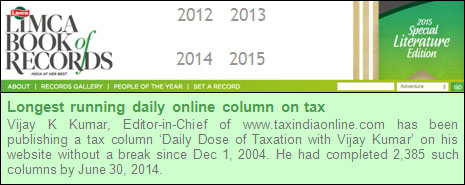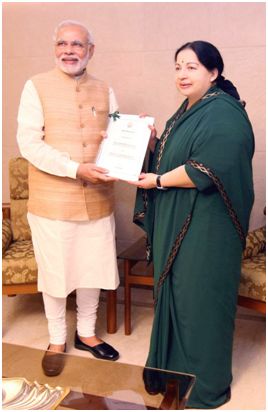
10 08 2015
Monday
IN October 2013, the Government of India announced the sanction for setting up of six additional benches of CESTAT - three at the existing locations of New Delhi, Mumbai and Chennai and three new Benches at Chandigarh, Allahabad and Hyderabad.
DDT 2212 18.10.2013 commented, "The cabinet approval does not mean that the new Benches will start functioning from tomorrow - the most difficult job is to get Members for the Tribunal."
It is nearly two years since the Government notification and the new benches are yet to start functioning.
On 8-4-2015, the Allahabad High Court directed the officials concerned of the Ministry of Finance to file affidavits explaining as to why the Union of India is failing to enforce Notification pertaining to the establishment of CESTAT Benches at Allahabad, Hyderabad and Chandigarh. The Affidavits were required to be filed by 27-4-2015 but no affidavits were filed. However, on 27-4-2015 the High Court gave final opportunity to the officials to file the affidavit positively by 12-5-2015 or otherwise to remain present in the court. On 12.5.2015, the High Court directed that the CESTAT should start functioning at Allahabad at least for the new cases filed from 1.7.2015. The High Court issued notice to the Central and State Governments and the Registrar of CESTAT to file affidavits explain why the CESTAT is not functioning from Allahabad. The case was posted for 31 st July 2015.
On 31st July, the High Court ordered:
The matter be listed again before the appropriate Bench on 7th August, 2015 along with connected matter. In the mean time the Registrar may ensure that:
(a) The circuit bench remains at Allahabad at least seven days in a month;
(b) The Registrar may search for a suitable space in an existing Central Government building in the city of Allahabad for establishing the permanent Bench of the Tribunal;
(c) If required, the Central Government may requisition the properties which are let out or are in possession of private persons at different places in the city of Allahabad for establishing the Tribunal.
On 7.8.2015, last Friday, when the case came up before the Bench, the Court ordered:
Various affidavits by various authorities have been filed pursuant to the order of the Court dated 12.5.2015 passed in Writ Tax No.354 of 2015 and order dated 8.7.2015 passed in Central Excise Appeal No.135 of 2015. Various stands have been taken indicating difficulties in establishing a permanent Bench of the Central Excise Tribunal at Allahabad pursuant to the notification dated 1.11.2013. We find from the short counter affidavit filed by the Registrar Custom Excise and Central Excise Customs Appellate Tribunal, New Delhi on behalf of the respondent nos. 1 and 2 dated 11.5.2015 that the Tribunal had issued a letter dated 14.11.2013 to the Chief Secretary, Uttar Pradesh requesting his assistance to make available a suitable accommodation of 15,000 Sq. ft. at Allahabad, pursuant to which the Joint Secretary issued a letter dated 17.12.2013 to the District Magistrate, Allahabad to do the needful. It is not known as to what has transpired thereafter.
We, accordingly, request the District Magistrate, Allahabad to be present in Court on 11.8.2015 and intimate as to what action he has taken on the basis of the letters dated 14.11.2013 and 17.12.2013.
And the Bench remains elusive.
If accommodation is the problem in Allahabad, what is the problem in Hyderabad, where accommodation has been hired more than six months ago and it seems rent is being paid? They don't seem to have enough Members to be posted in the new benches.
GST - the Jaya Model
 PRIME Minister Narendra Modi met the Tamil Nadu Chief Minister Jayalalithaa on Friday. Madam Chief Minister gave a rousing welcome to the Hon'ble Prime Minister. Apart from presenting him a beautiful large flowery bouquet, she also presented a bulky memorandum which contained the opinion of the Tamil Nadu Government on GST. PRIME Minister Narendra Modi met the Tamil Nadu Chief Minister Jayalalithaa on Friday. Madam Chief Minister gave a rousing welcome to the Hon'ble Prime Minister. Apart from presenting him a beautiful large flowery bouquet, she also presented a bulky memorandum which contained the opinion of the Tamil Nadu Government on GST.
"Tamil Nadu is concerned about the impact the proposed GST will have on the fiscal autonomy of States and the huge permanent revenue loss it is likely to cause to a manufacturing and net exporting State like Tamil Nadu. I had suggested an alternative radical approach in which the levy, collection and appropriation of the substitutes for VAT, Central Excise Duty and Service Tax within a State could be delegated completely to the State machinery, with the Central machinery focusing on interstate taxation", she told the Prime minister.
She further told him that the stand of the Government of Tamil Nadu is that before the Constitutional Amendment Bill on GST is taken up, the Government of India should strive for a broad consensus on important issues like the compensation period and methodology, revenue neutral rates, floor rates with bands, commodities to be excluded from GST, the IGST model and clarity on dual administrative control, so that the genuine apprehensions of States regarding loss of fiscal autonomy and permanent revenue loss are allayed.
The TN view on important issues pertaining to GST:
- GST Council as a constitutional body impinges on the legislative sovereignty of both the Parliament and the State Legislature and completely jeopardizes the autonomy of the States in fiscal matters. We strongly object to the provision for the GST Council. The existing mechanism of the Empowered Committee of State Ministers which dealt with VAT issues is adequate. Ideally, no statutory GST Council is required.
- Furthermore, the decision making rule and voting weightage in the proposed Council are completely unacceptable. They give the Government of India an effective veto in the GST Council and no distinction is sought to be made amongst the States in weightage. Hence, if at all a Council is formed, the weightage of the vote of the Central Government should be reduced to one-fourth of the total votes cast and that of the States should be increased to three-fourths of the total votes cast. Further, the weightage of each State's vote should be in proportion to the representation of each State in the Council of the States. This is important as the changeover to GST has different implications for different States based on their size and reliance on own tax revenues.
- Petroleum and Petroleum products must be kept outside GST in view of the revenue impact and the positive environmental and social impact of high effective taxation on these items.
- There is a need to enable the States to levy higher taxes on tobacco and tobacco products on par with the Centre, as States like Tamil Nadu already levy a higher rate of tax on tobacco and tobacco products on account of the public health concerns.
- It is quite clear that a manufacturing State like Tamil Nadu will permanently lose substantial revenue if GST is implemented, due to the shift of the levy from the point of origin to the point of destination and also due to the phasing out of Central Sales Tax and transfer of input tax credit on inter-State sales and inter-State stock transfers to the destination States. Due to the difficulty in fixing even nominally high revenue neutral rates, it is expected that the extent of revenue loss under GST would be around Rs.9270 crores for Tamil Nadu.
- Tamil Nadu reiterates the need for a constitutionally mandated independent compensation mechanism for full (100 per cent) compensation of revenue losses suffered by the States for a period of not less than five years.
- In lieu of the proposed additional levy of 1 per cent tax on Inter-State supply of goods, Tamil Nadu suggests that the origin States may be allowed to retain 4 per cent of the Central GST part of the Inter-State GST that would be leviable on inter-State supply of goods and services as this would ensure speedy recompense for a portion of the revenue loss and will reduce the amount of compensation payable. Further, as this comes out of the CGST component, it does not affect the destination State's revenue or cause any cascading.
- Hence, the stand of the Government of Tamil Nadu is that before the Constitutional Amendment Bill on GST is taken up, the Government of India should strive for a broad consensus on important issues like the compensation period and methodology, revenue neutral rates, floor rates with bands, commodities to be excluded from GST, the IGST model and clarity on dual administrative control, so that the genuine apprehensions of States regarding loss of fiscal autonomy and permanent revenue loss are allayed.
Come to Office on Time and don't leave early; don't leave hqrs without permission - CBDT tells officers
SOME government officers are never late twice in the day in the office. If they come late to the office in the morning, they leave early in the evening! For some the five day week is effectively a four day week. Go to any office on a Friday evening; you will find more than half the office empty - babus have already gone for their weekend. Repeat your visit on Monday morning and you will find the same empty offices - babus are yet to reach after the weekend.
In our Revenue offices, they give personal hearing at 10 O' clock and till 11.30, nobody reaches offices. Counsel and assessees are condemned to wait in dingy verandas.
The CBDT came to know about this situation recently. The Board in a letter to the Principal Chief Commissioners and Principal DGs stated:
- It has been brought to the notice of the Board that some officers/staff of the income Tax Department are leaving their stations/headquarters early on Fridays, during weekend and holidays, and joining their duties late on next working day.
- It is further noticed that many a time no permission is being taken from the superior controlling authorities before leaving station/headquarters as required under the rules.
- Apart from disturbing decorum and office discipline, this practise of leaving stations/headquarters by the officers /staff without prior permission and not observing the office timings, is causing inconvenience to the taxpayers and members of public who visit income tax offices in connection with their tax matters either by prior appointment or otherwise.
- This has been viewed adversely by the Chairperson, CBDT.
- Failure to obtain permission of competent authority before leaving station/headquarters is to be viewed seriously and may entail disciplinary action.
- All cadre controlling Pr, Chief Commissioners of Income Tax /Pr. Directors general of Income Tax are requested to instruct all the officers and staff working in offices under their cadre control to refrain from leaving their station /headquarters without prior permission and to strictly observe the prescribed office timings.
- Necessary instructions may be issued to all field formations in this regard for strict compliance under intimation to the Board immediately.
For the field formations, receiving such instructions is not a new phenomenon. A similar one was issued last August also. See DDT 2422. But does anyone bother? And the height of compliance is sending a ‘Nil' report in the matter. After all, Instructions are meant to be issued for issuance sake - also see DDT 2533, 2625.
CBDT letter in F.No.Dir(Hqrs) /Ch.(DT)/29/2013., Dated August 07, 2015
Customs duty imposed on import of wheat
THE Australian Newspaper 'The Weekly Times' reported on 5th August that the wheat exports from Australia to India are expected to dry up following plans by the Indian government to slap a 10 per cent import duty on the grain.
And the Indian Government imposed the 10% import duty on 7th August.
Wheat was charged to nil duty as per Sl. No.34 of the Table to the Notification No. 12/2012-Cus. Now it is made 10% till 1st day of April 2016. Why did the Government impose this duty?
Indian traders are importing huge quantities of quality wheat from Australia in preference to the low quality wheat sold by FCI. And FCI is holding huge quantities of low quality wheat that has to be disposed of. And so they don't want any imports.
Already Australian wheat has reached Indian ports and many shipments are on the way - they will now suffer the 10% duty.
Did the Customs collect the newly imposed 10% on Friday to Sunday? After all the notification was effective from Friday and the Customs Commissionerates have no way to know about this as the Australian newspaper.
Notification No. 44/2015-Customs, Dated: August 7, 2015
Until Tomorrow with more DDT
Have a nice day.
Mail your comments to vijaywrite@tiol.in |









 Download PDF
Download PDF
 PRIME Minister Narendra Modi met the Tamil Nadu Chief Minister Jayalalithaa on Friday. Madam Chief Minister gave a rousing welcome to the Hon'ble Prime Minister. Apart from presenting him a beautiful large flowery bouquet, she also presented a bulky memorandum which contained the opinion of the Tamil Nadu Government on GST.
PRIME Minister Narendra Modi met the Tamil Nadu Chief Minister Jayalalithaa on Friday. Madam Chief Minister gave a rousing welcome to the Hon'ble Prime Minister. Apart from presenting him a beautiful large flowery bouquet, she also presented a bulky memorandum which contained the opinion of the Tamil Nadu Government on GST.



